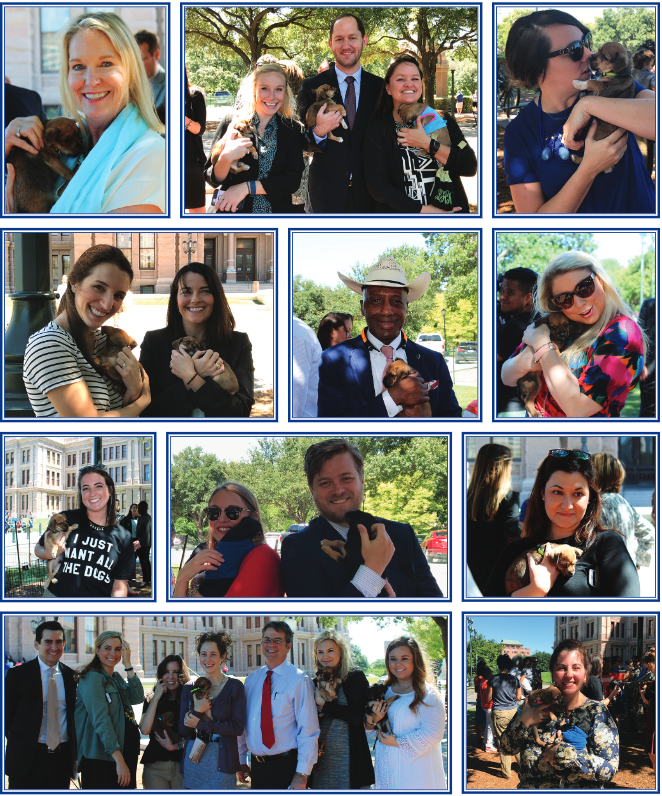A Successful Session for Civil Justice
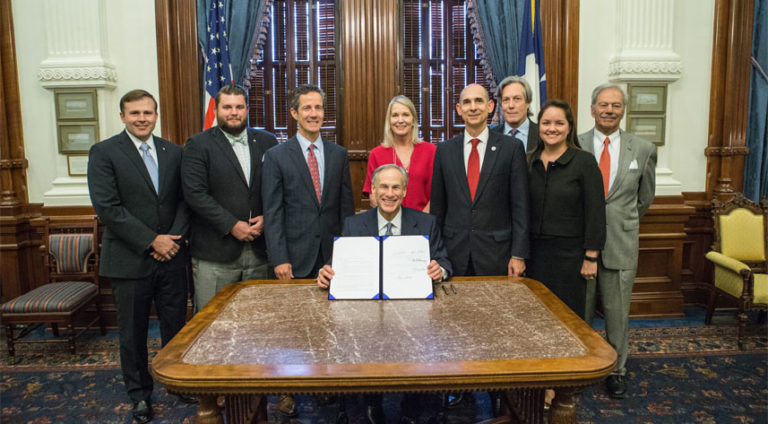
Gov Abbott is joined by Sen. Hancock and Rep. Bonnen, their staffs and TLR representatives for the signing of HB 1774 on May 27.
Will Rogers observed that, “we could certainly slow down the aging process if it had to work its way through the Legislature.” We know what he meant, as we contemplate the long journey taken by the legislation to end abusive mass-tort litigation around weather events. After two legislative sessions and three years of hard work with our business allies and key elected officials, we are proud that HB 1774 will take effect on September 1. (For a description of the essential elements of this bill, please read Lee Parsley’s article.)
Many elected officials played critical roles in the enactment of HB 1774, which passed with overwhelming majorities in both the Senate (21-8) and the House (92-55). The legislative leaders—Gov. Greg Abbott, Lt. Gov. Dan Patrick and Speaker Joe Straus—took effective action to stop this blatant lawsuit abuse.
The bill authors, Rep. Greg Bonnen and Sen. Kelly Hancock, worked tirelessly and managed the legislation flawlessly in their respective chambers. Rep. Bonnen and Sen. Hancock were simply superb in handling this legislation. They received strong assistance from many of their colleagues, especially those who jointly authored the companion bills and those who served on the committees that considered the bills.
This was a successful session for the Texas civil justice system, and for this, we are grateful to you—our volunteers and supporters—for joining TLR’s staff, lawyers, consultants and lobbyists in working with our elected officials to enact important public policies
Protecting Texas Families and Businesses
By Sen. Kelly Hancock (R-North Richland Hills), Senate Sponsor of HB 1774

It’s a done deal! Weather-related lawsuit reform legislation will officially take effect Sept. 1, 2017.
Looking back at the progression of these reforms, one key element stands out: a strong and dedicated team of policy professionals, industry experts, legislative colleagues, staffers, constituents, consumer advocates and others united in the desire to see Texas thrive.
Our role on that team began in 2015, when the Senate Business and Commerce Committee was charged with studying the root causes of weather-related lawsuit abuse and how to fix it.
I had recently seen firsthand how critical this issue had become. Friends of ours run a mid-sized, family owned and operated insurance company in the DFW Metroplex, and they were in the midst of battling a huge surge in unnecessary, pre-claim lawsuits that were costing the company heavily.
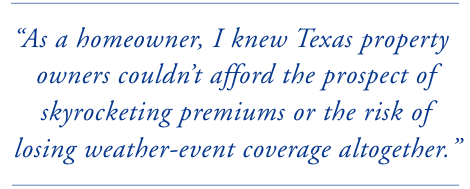
At our interim committee hearing, some daunting statistics came to light that told a similar story statewide. Testimony from the Texas Department of Insurance (TDI) centered on a new report that showed a quantifiable and undeniable litigation explosion (to the tune of a 1,400 percent increase in the lawsuit-to-claim ratio!) created by storm-chasing bad actors. TDI also reported that multiple insurance companies had been forced to raise rates or stop writing policies as a result. Clearly, the problem was significant and widespread. And with the amount of severe weather we experience here in Texas, we could not afford to let that problem keep spiraling out of control.
As a homeowner, I knew Texas property owners couldn’t afford the prospect of skyrocketing premiums or the risk of losing weather-event coverage altogether. As a business owner and legislator, I felt strongly that we had to curb the damage being done to job creators across our state. That is why I was eager to take up the fight this session. I filed Senate Bill 10—the companion bill to HB 1774—and also sponsored Rep. Greg Bonnen’s HB 1774 when it made its way to the Senate. Our team gained some power hitters as we approached the 2017 legislative session. Gov. Abbott mentioned the need for hailstorm litigation reform during his State of the State address, and Lt. Gov. Patrick reserved a priority spot for a legislative fix in the Senate.That fix, HB 1774, made it through the full legislative process this session and will address the problem in a few primary ways when it takes effect later this year:
First, the bill gives an insurance company 60 days to resolve a disputed claim before being taken to court. This common-sense provision should both limit litigation abuse and encourage insurers to quickly and fairly settle all claims.
Second, the bill places reasonable limits on recoverable attorney fees, removing an incentive for bad actor attorneys to inflate estimated damages. Finally, the legislation will protect individual employees of an insurance agency from being personally sued simply for doing their jobs.
It was a privilege to be part of the team that worked on this issue. This was a tremendous effort, the effects of which will protect families and businesses for years to come. I’m confident Texas will be better off because of it. That is, after all, the ultimate goal.
Smart Lawsuit Reforms Continue to Deliver
By Rep. Greg Bonnen (R-Friendswood), House Author of HB 1774

As a practicing physician who also represents a coastal district, I’ve seen firsthand the toll lawsuit abuse can take on a community.
For example, before the game-changing medical liability reforms of 2003, doctors in high-risk specialties like mine were leaving Texas in droves, unable to grapple with the litigious environment that made practicing medicine in the Lone Star State almost impossible. The Legislature understood that doctors needed to spend more time in the operating room than in the courtroom. Thanks to sensible lawsuit reforms, doc-tors are now practicing in specialties and in areas of the state that were severely underserved before. That means the difference between life and death for thousands of Texans.
Fast forward a few years to Hurricane Ike’s swath of devastation along the Gulf Coast. Plaintiff lawyers saw an opening to deploy a mass-litigation model, this time focused on suing the Texas Windstorm Insurance Association (TWIA). This litigation nearly bankrupted TWIA, which serves as a critical insurer for property owners up and down the coast.
In passing the TWIA reform bill, no one realized that plaintiff lawyers would soon direct that same litigation model toward the private insurance market after more common storms.
This new lawsuit abuse is seen most frequently after hailstorms but occurs following any natural disaster affecting large areas of private property. The storm-chasing attorneys use unethical means to obtain clients, disregard the rules for pre-suit notice, greatly exaggerate the damages due to their clients, sue individuals unnecessarily and bundle plaintiffs together in an attempt to overwhelm the system and settle cases in bulk.
A study by the Texas Department of Insurance revealed disturbing trends in the rate of lawsuit filings and the actions insurance companies were taking to compensate for the cost of litigation, like raising rates for homeowners or pulling coverage out of areas altogether. But it didn’t stop there.
The plaintiff lawyers’ model is designed to exploit our state’s laws. For example, the attorneys figured out that suing a Texas-based individual, like a company employee or an adjuster, in addition to the insurance company would help them manipulate the venue and keep cases in a state court of their choosing.
This led to an estimated 14,000 individuals—mostly insurance adjusters—being sued for simply doing their jobs. Many people don’t realize that a pool of working adjusters travels the country in response to natural disasters in order to ramp up the claims process quickly. Unfortunately, since this lawsuit abuse began, out-of-state adjusters have started shying away from working in Texas because of the near certainty of being sued. That means the next time a major hurricane, flood, tornado or wildfire hits the state, we could be facing a self-inflicted shortage of adjusters. This would result in longer wait times to process claims, which would naturally lead insurers to miss deadlines for payments and create even more opportunities for mass-tort litigation.
Further, because coastal communities are always vulnerable to some of Mother Nature’s worst, we need access to a variety of affordable private insurance options in addition to TWIA. But what incentive do we give to private insurers to enter an already risky market if they know it’s also a hotbed of unnecessary litigation?
That’s why I fought to pass House Bill 1774 this session. By stopping this weather-related lawsuit abuse, we will protect Texas property owners from seeing a litigation tax added onto their insurance bills, and we will expand the ability of some of our most vulnerable property owners to find affordable insurance. We’ve also protected property owners’ legal rights in the event an insurer doesn’t meet its obligations. Texas still provides some of the strongest consumer protections in the nation for policyholders.
Whether it’s medical malpractice, TWIA or private property insurance, lawsuit reforms have delivered on their promise to keep our economy strong and protect Texas families and businesses. I’m proud to have been part of this effort this session, and will continue to fight for fairness and balance in our legal system in Texas.
The Leadership Behind the Fight to Stop Storm-Chasing Lawyers
The enactment of the common-sense reforms in House Bill 1774 would not have been possible without the principled leadership of our statewide officials and many legislators in both the House and Senate.
Gov. Greg Abbott expressed his support early in the session for stopping weather-related lawsuit abuse from wrecking our economy by citing its importance in his State of the State address.

Lt. Gov. Dan Patrick made passage of this legislation one of his top ten priority items for the session and consistently supported the bill as it worked through the legislative process.

House Speaker Joe Straus appointed strong leadership with clear track records on tort reform to the committees most critical to improving our civil justice system and stopping the latest form of lawsuit abuse.
Two exceptional legislators did the heavy lifting on the storm-chasers bill—House author Greg Bonnen (R-Friendswood) and Senate sponsor Kelly Hancock (R-North Richland Hills). They worked diligently to understand the root causes of this lawsuit abuse and devel-oped a balanced solution to protect Texas property owners.

Crucial to this process was the work of Rep. Larry Phillips (R-Sherman), chair of the House Insurance Committee, who quickly saw the need to pass a balanced solution to protect property insurance consumers in Texas. A true courtroom attorney, Chairman Phillips’ drafting contributions, as well as his leadership role in working with and understanding the concerns of interested stakeholders, resulted in a better bill for Texas consumers. By acting quickly to vote the bill out of his committee, Phillips ensured HB 1774 would have ample time to be heard on the House floor.

The chair of the crucially important House Calendars Committee, Rep. Todd Hunter (R-Corpus Christi), and a majority of the members of that committee worked closely with TLR during the interim before the session and acted quickly and decisively to get HB 1774 to the floor of the House early enough on the legislative calendar to allow its eventual success.
Rep. John Smithee (R-Amarillo), chair of the Judiciary and Civil Jurisprudence Committee, continued to be a strong advocate for a fair and balanced legal system this session. He laid the groundwork for this reform legislation in his work in previous sessions on simi-lar reforms to the Texas Windstorm Insurance Association Code and the Texas Insurance Code.

Rep. Tan Parker (R-Flower Mound) is chair of the House Republican Caucus, which represents all 95 Republican House members. His leadership—and that of other officers in the Republican Caucus—during the floor debate on HB 1774 was critical to keeping damaging or unnecessary amendments from being added to the bill and securing final passage by an over-whelming majority.

Sen. Larry Taylor (R-Friendswood) was a vocal advocate for HB 1774 and a strong ally to Sen. Hancock in the Business and Commerce Committee and on the Senate floor. Taylor carried legislation aimed at addressing the issue of weather-related lawsuit abuse last session, and is acutely aware of the problems created by this abuse for communities across the state.
It takes a village to pass meaningful reforms each session that make Texas a better place for families and businesses, and TLR is proud to have worked with each of these leaders this session to protect consumers from lawsuit abuse.


House Bill 1774: The Basics
By Lee Parsley, TLR General Counsel
HB 1774 creates a new chapter in the Texas Insurance Code—Chapter 542A—that applies to all insurance companies authorized to write property insurance in the state, except the Texas Windstorm Insurance Association, which has its own claim-settlement statute. Through its definition of a “claim,” Chapter 542A covers only first-party lawsuits related to an insurance policy covering damage to real property if the damage was caused by a force of nature.

Chapter 542A includes a requirement that is already applicable to claim-related lawsuits: that a claimant provide—at least 60 days before a lawsuit is filed—notice to an insurer or individual that he or she intends to sue on a claim-related dispute. As shown below, the elements of this pre-suit notice are straightforward and include the new requirement that the claimant’s lawyer provide a statement of her fees based on the hours actually worked up to the time the notice is provided.
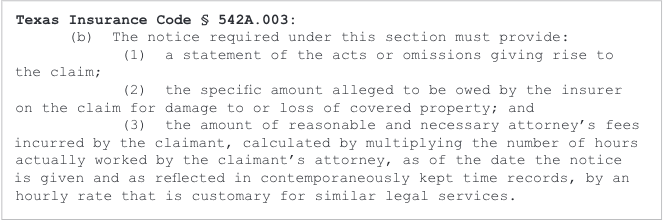
Notably, Chapter 542A provides that a pre-suit notice is not required if the lawsuit is filed on the eve of the expiration of the limitations period.

The purpose of the pre-suit notice is to create an opportunity to resolve the dispute before a lawsuit is filed. Thus, giving a pre-suit notice triggers two rights held by the insurance company under the law: the right to inspect the claimant’s property and the right to make a settlement offer.
Under Chapter 542A, the failure to give pre-suit notice when required may cause the attorney to lose the right to recover some attorney fees.

To encourage realistic demands, HB 1774 provides that if an attorney wins for her client 80 percent or more of the amount demanded in the pre-suit notice, the attorney may have all of her fees paid by the insurer. If the attorney wins less than 20 percent of the amount demanded, she is not awarded any attorney fees. In between, the award of attorney fees is proportional.
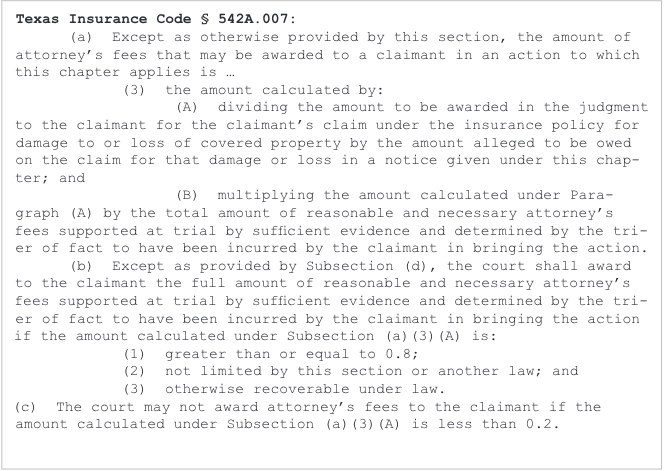
HB 1774 will prevent needless lawsuits against individuals by providing that an insurance company may irrevocably assume the liability of any employee, agent, representative or adjuster who is sued in a claim-related dispute by a policyholder.
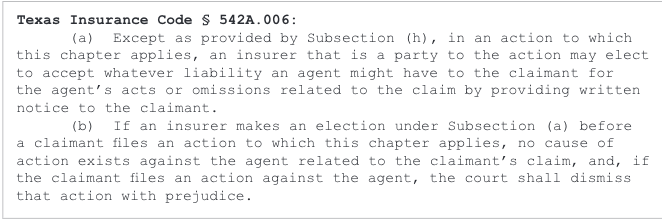
If the insurance company assumes this liability, it must make the dismissed individual available for deposition testimony, and the case is tried as if the individual was party to the case. The insurance company must pay any damages attributed to the individual.
Finally, HB 1774 creates a market-based penalty for an insurance company’s failure to timely pay a claim. Today, under the Prompt Payment of Claims Act, if an insurance company fails to pay a claim within the statutory deadline, it is liable for an 18 percent per annum penalty. To reflect fluctuations in the interest rate market while ensuring the penalty remains sufficient to compel insurance companies to pay claims on time and in full, HB 1774 creates a variable penalty interest rate based on the post-judgment interest rate calculated pursuant to a specified section of the Texas Finance Code.
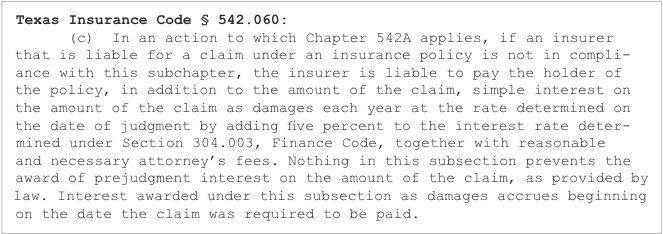
By adding five percent to the post-judgment interest rate, HB 1774 creates a penalty interest rate that cannot drop below 10 percent or exceed 20 percent. The penalty interest rate is five percent above the prime rate any time the prime rate is between five and 15 percent.

Also, under current law and under HB 1774, an insurance defendant must pay pre-judgment interest on the unpaid amount that was owed under the insurance policy in addition to the penalty interest.
Enacting Good Public Policy for a Better Texas
In addition to working with the Legislature to rein in abusive weather-related lawsuits, TLR actively sup-ported several bills in the 85th Legislature directly related to our civil justice system. TLR also worked with lawmakers and stakeholders on a number of bills to ensure they were tightly crafted and did not create opportunities for abuse by unscrupulous attorneys. Bills in which TLR was actively engaged include:
HB 25 by Rep. Ron Simmons (R-Carrollton)
One-punch straight-party voting in general elections in Texas has been a significant contributor to “sweeps” that have seen highly qualified judges of both major political parties swept out of office in Texas’ largest counties. Many Texas judges have been defeated for re-election for reasons that have nothing to do with their qualifications, performance or character. These partisan sweeps destabilize the judiciary and impede the fair and efficient administration of justice. We hope the likelihood of these sweeps will be substantially lessened by the elimination of straight-party voting in Texas. HB 25 has been signed by the governor.
HB 1463 by Rep. John Smithee (R-Amarillo)

Ensuring individuals with disabilities have equal access to public places is a critical protection in our laws and a measure TLR fully supports. However, unscrupulous lawyers have found a way to exploit this important statute. Following a model popular in California and other states, a single lawyer recently filed a spate of lawsuits for a single client based on the lawyer’s visual inspection of parking lots and other exterior features of business properties.
Many of the alleged barriers to access were easily repairable, but the lawyer sought only payment, not a repair. Under HB 1463, before a lawsuit may be filed under a specific Texas statute alleging that an architectural barrier prevents access to a public facility, the owner or lessee of the property must be given notice of the impediment and an opportunity to fix it. If it is not fixed, the lawsuit may proceed. The goal of HB 1463 is to ensure people with disabilities continue to have full access to public places, and that any barriers to access are immediately fixed, while stopping the unscrupulous “drive-by” lawsuit industry. It has been signed by the governor.
HB 1761 by Smithee
This bill allows the Texas Supreme Court to accept jurisdiction of any appeal that is important to the state’s jurisprudence, whether that appeal is from a final judgment or an appealable pretrial order. HB 1761 will streamline procedure for the court and eliminate the need to write extensive briefs discussing the court’s jurisdiction, saving both the court and litigants time and expense. It has been signed by the governor.
SB 42 by Sen. Judith Zaffirini (D-Laredo)
On Nov. 6, 2015, State District Judge Julie Kocurek was shot in the driveway of her Austin home by a criminal defendant. Judge Kocurek recovered from her wounds, but the attack highlighted the need to enhance security for Texas judges and court personnel. SB 42 is an important bill that will help state and local policy-makers take steps toward providing these public servants with the security they deserve. SB 42 has been signed by the governor.
SB 44 by Zaffirini
An eleventh-hour amendment to a bill during the 2015 legislative session repealed a Texas statute requiring candidates for judicial office to obtain petition signatures to secure a place on the ballot. Having a requirement to obtain petition signatures from qualified voters helps ensure that serious candidates seek judicial office. SB 44 restored to Texas law the petition signature requirement. It has been signed by the governor.
SB 179 by Sen. José Menéndez (D-San Antonio)
Named “David’s Law” in memory of David Molak, a San Antonio teenager who committed suicide after being relentlessly bullied through text messages and social media, SB 179 creates mechanisms to deter cyberbullying of a minor. Initially, SB 179 contained a cause of action against minors who participate in cyberbullying and their parents. Ultimately, the bill was refined to allow a court to issue an order prohibiting specified persons from participating in cyberbullying. TLR worked closely with the bill authors to ensure the legislation was written so that it could not be abused for ill gain by unscrupulous plaintiff attorneys. SB 179 has been signed by the governor.
SB 873 by Sen. Brandon Creighton (R-Conroe)

A few Texas plaintiff lawyers have begun to pursue class action lawsuits against apartment owners alleging that a common practice for dividing a water bill among tenants violates Texas statutes. SB 873 creates a simple administrative process for tenants who believe they have been over-billed to use to resolve metering issues with landlords. The new statute allows tenants to pursue litigation if the administrative process fails, but it should discourage needless and expensive class action litigation. SB 873 has been signed by the governor.
SB 944 by Sen. Bryan Hughes (R-Mineola)
A recent federal court decision demonstrated a short-coming in existing Texas law for collecting a judgment rendered by a foreign court. SB 944 replaces the existing statute with the Uniform Foreign-Country Money Judgments Recognition Act, which ensures that Texas courts enforce foreign judgments that deserve recognition, while rejecting foreign judgments from countries whose judicial systems do not provide impartial trials or procedures compatible with the requirements of due process of law, or when the judgment or cause of action on which the judgment is based is counter to the public policy of Texas or the U.S. SB 944 has been signed by the governor.
TLR also supported other bills that would have implemented good public policy and created greater efficiency and access to the courts. While unfortunately some did not pass this session, TLR will continue to work on these issues for next session. HB 2300 by Rep. Mike Schofield (R-Katy) was designed to end plaintiff lawyers’ use of mechanisms to avoid the “paid or incurred” statute, an element of HB 4 passed in 2003 that states that only medical expenses actually paid or owed can be awarded as damages. HB 4 ended the practice of awarding phantom medical damages, but some trial lawyers, working with a few cooperative doctors, are finding a way to avoid the application of the paid or incurred statute. Additionally, HB 2301 by Schofield would have clarified the procedures for submitting affidavits that are used to prove the reasonableness of medical records at trial. HB 2574 by Rep. Andy Murr (R-Junction) would have slightly increased the jurisdictional limit in a statute advocated by TLR in 2011 (HB 274). The change proposed in HB 2574 would have allowed more cases to receive expedited treatment in Texas trial courts. Similarly, TLR supported SB 409 by Sen. Don Huffines (R-Dallas), which would have increased the civil jurisdiction of justice of the peace courts, thus allowing Texans to resolve more small claims quickly and without having to engage a lawyer.
In addition to supporting good legislation, TLR also opposed legislation that would have created negative consequences for Texans. For example, TLR weighed in against HB 719, which sought to erode part of the landmark civil justice reform bill of 2003 (HB 4) by increasing the $750,000 cap on non-economic damages in healthcare liability cases. TLR also opposedHB 1258, which sought to limit the Texas Supreme Court’s ability to create inexpensive, universal access to Texas court records. HB 1258 would have interfered in a goal that has been pursued by the Texas Supreme Court for almost 20 years—to convert the judicial system from one that is paper-based to an open and accessible electronic records system. Fortunately, neither bill was passed into law.
Best Wishes to a TLR Team Member

Sarah Talley, TLR’s special projects manager, will head to Spain to start a new adventure at the end of the summer. Sarah’s diligence, attention to detail and research on the costs and consequences of weather-related lawsuit abuse in Texas were critical to the effort to pass HB 1774. In addition to keeping the office running steadily and efficiently, coordinating the hundreds of bills that are reviewed by TLR’s staff and attorneys and helping manage TLR’s interns, Sarah is an eager coworker and gentle presence in the Austin office.
Sarah, a native of University Park, received a bachelor’s degree in history from DePaul University and a master’s degree in contemporary British history from King’s College London. Before joining TLR in 2015, she worked in the Capitol office of State Rep. Morgan Meyer.
Sarah and her husband, Nathan Smith, were married in June, and depart for Europe later this summer as Nathan pursues a master’s degree in contemporary performance. While we will miss seeing Sarah every day, we wish her the best of luck on her new adventure and a lifetime of happiness inher new marriage.
The Legislation to End Abusive Weather-Related Litigation Garnered Enormous Support
Since powerful plaintiff trial lawyers made every effort to prevent passage of legislation that would end abusive weather-related lawsuits, it was necessary for TLR and its legislative allies to build momentum early in the session. Sen. Hancock and Rep. Bonnen crafted fair, focused legislation to address the abuse—which was clearly hurting Texas consumers—leading an extraordinary number of legislators to sign on as co-authors.
In the Senate, 21 members co-authored SB 10 (companion to HB 1774):
Kelly Hancock (R-North Richland Hills)*—primary author, Brian Birdwell (R-Granbury)—joint author, Brandon Creighton (R-Conroe)*—joint author, Joan Huffman (R-Houston)—joint author, Eddie Lucio Jr. (D-Brownsville)—joint author, Larry Taylor (R-Friendswood)*—joint author, Paul Bettencourt (R-Houston), Dawn Buckingham (R-Lakeway), Konni Burton (R-Colleyville), Donna Campbell (R-New Braunfels)*, Craig Estes (R-Wichita Falls)*, Bob Hall (R-Canton), Don Huffines (R-Dallas), Bryan Hughes (R-Mineola), Lois Kolkhorst (R-Brenham), Jane Nelson (R-Flower Mound), Robert Nichols (R-Jacksonville)*, Charles Perry (R-Lubbock), Charles Schwertner (R-Georgetown)*, Kel Seliger (R-Amarillo), Van Taylor (R-Plano)
* Member of Senate Business and Commerce Committee
In the House of Representatives, 86 members co-authored HB 1774:
Greg Bonnen (R-Friendswood)—primary autho, rJohn Frullo (R-Lubbock)—joint author, Eddie Lucio III (D-Brownsville)—joint author, Tan Parker (R-Flower Mound)—joint author, Larry Phillips (R-Sherman)**—joint author, Charles “Doc” Anderson (R-Waco), Rodney Anderson (R-Grand Prairie)**, Trent Ashby (R-Lufkin)***, Ernest Bailes (R-Shepherd), Cecil Bell (R-Magnolia), Kyle Biedermann (R-Fredericksburg), Dwayne Bohac (R-Houston), Dennis Bonnen (R-Angleton), Cindy Burkett (R-Sunnyvale), DeWayne Burns (R-Cleburne), Dustin Burrows (R-Lubbock), Angie Chen Button (R-Garland), Briscoe Cain (R-Deer Park), Giovanni Capriglione (R-Southlake), Scott Cosper (R-Killeen), Tom Craddick (R-Midland), John Cyrier (R-Lockhart), Tony Dale (R-Cedar Park), Drew Darby (R-San Angelo), Sarah Davis (R-West University Place)***, Jay Dean (R-Longview), Gary Elkins (R-Houston), Wayne Faircloth (R-Galveston), Pat Fallon (R-Frisco), Dan Flynn (R-Van), James Frank (R-Wichita Falls), Craig Goldman (R-Fort Worth), Larry Gonzales (R-Round Rock), Cole Hefner (R-Mount Pleasant), Justin Holland (R-Rockwall), Dan Huberty (R-Houston), Jason Isaac (R-Dripping Springs), Kyle Kacal (R-College Station)***, Mark Keough (R-The Woodlands), Phil King (R-Weatherford), Stephanie Klick (R-Fort Worth), Linda Koop (R-Dallas)***, Matt Krause (R-Fort Worth), John Kuempel (R-Seguin), Stan Lambert (R-Abilene), Brooks Landgraf (R-Odessa), Mike Lang (R-Granbury), Lyle Larson (R-San Antonio), Jodie Laubenberg (R-Parker), Jeff Leach (R-Plano), J.M. Lozano (R-Kingsville), Will Metcalf (R-Conroe), Morgan Meyer (R-Dallas), Rick Miller (R-Sugar Land), Geanie Morrison (R-Victoria), Jim Murphy (R-Houston), Andy Murr (R-Junction), Tom Oliverson (R-Cypress)**, Chris Paddie (R-Marshall)***, Dennis Paul (R-Webster)**, Dade Phelan (R-Port Neches)***, Four Price (R-Amarillo), John Raney (R-Bryan), Matt Rinaldi (R-Irving), Scott Sanford (R-McKinney)**Mike Schofield (R-Katy), Leighton Schubert (R-Caldwell), Matt Shaheen (R-Plano), J.D. Sheffield (R-Gatesville), Hugh Shine (R-Temple), Ron Simmons (R-Carrollton), John Smithee (R-Amarillo), Drew Springer (R-Muenster), Phil Stephenson (R-Wharton), Lynn Stucky (R-Sanger), Valoree Swanson (R-Spring), Ed Thompson (R-Pearland), Tony Tinderholt (R-Arlington), Gary VanDeaver (R-New Boston), Jason Villalba (R-Dallas), James White (R-Hillister), Terry Wilson (R-Marble Falls), Paul Workman (R-Austin), John Wray (R-Waxahachie), Bill Zedler (R-Arlington), John Zerwas (R-Richmond)
Additionally, these seven House members voted for final passage of HB 1774:
Byron Cook (R-Corsicana)***, Lance Gooden (R-Terrell)** ,Todd Hunter (R-Corpus Christi)***, Oscar Longoria (D-Mission), Kevin Roberts (R-Houston) ,Matt Schaefer (R-Tyler), Jonathan Stickland (R-Bedford)
** Member of House Insurance Committee
*** Member of House Calendars CommitteeStephanie


During the 85th Legislative session, two South Texas Democrats demonstrated—again—the strength of their character.
No one disputes that weather-related lawsuit abuse started in Hidalgo County in 2012 and spread to neighboring counties in the Rio Grande Valley. It was widely acknowledged by South Texas business leaders and lawmakers alike that the abuse was driven by storm-chasing lawyers, who were directly soliciting clients in flagrant violation of Texas criminal laws. The business community in the Valley spoke with a single voice, as chambers of commerce throughout the area supported legislation to end the abuse. Two Democrats in the Texas Legislature were willing to stand and be counted when it came time to fight—Sen. Eddie Lucio Jr. and Rep. Eddie Lucio III—both of whom were joint authors of the abuse-ending legislation supported by TLR.
TLR Day in the 85th Legislature
TLR’s strength lies in the support of thousands of Texans statewide who believe in a fair and honest civil justice system. On February 27, TLR hosted some of those supporters and elected officials at our legislative day in Austin. We kicked off the day with lunch and an engaging presentation by featured speaker J.D. Vance, author of the New York Times best-seller Hillbilly Elegy. Attendees received a legislative update from the TLR team on our priorities for the 85th Session and then headed to the State Capitol to visit their lawmakers’ offices and urge them to support Senate Bill 10 and House Bill 1774.
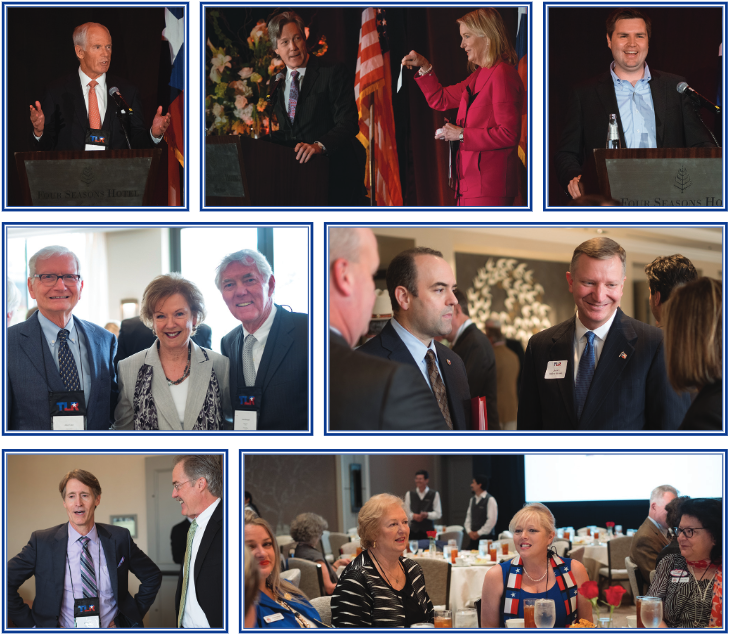

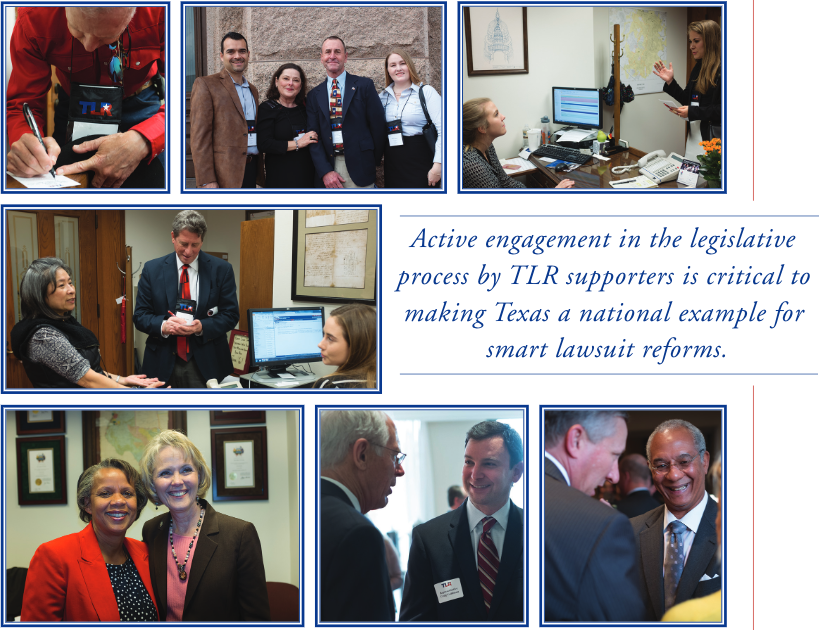
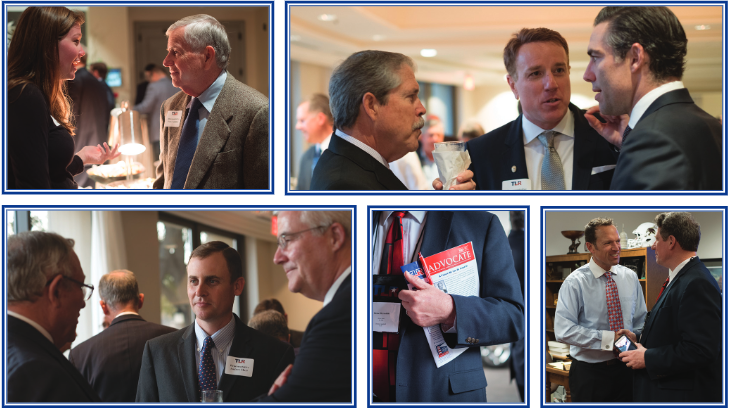
TLR Foundation Addresses Important Issues
The TLR Foundation is a nonprofit research organization that provides objective analysis of the challenges presented by the Texas civil justice system. The foundation regularly releases publications that reflect the comprehensive and in-depth legal research necessary to ensure Texas develops and maintains a civil justice system that serves the citizens of our state. In keeping with this practice, the foundation published two papers in the past few months on issues that have impacted the state’s civil justice system.
The first paper was prompted by a rash of lawsuits under the Americans with Disabilities Act (ADA) and a similar Texas statute. Over a few months in 2015, a single attorney filed hundreds of lawsuits against Austin-based businesses alleging the businesses had architectural features that did not comply with the law, like parking lots that lacked proper striping or handicap signs that were improperly placed. These lawsuits are commonly known as “drive-by lawsuits” because they are based on a quick visual inspection by an attorney rather than an instance of restricted access to the business by an individual with a disability. Virtually all of the alleged violations of the architectural standards were easily correctable. But in correspondence with each defendant, the lawyer did not demand the remediation of the alleged barriers to access. Instead, he sought payment of money. Similar lawsuit abuse has haunted California for more than two decades.
This unjustified rash of lawsuits prompted the TLR Foundation to study the ADA and a parallel Texasstatute to determine if the Texas law was ripe for further abuse.
In December 2016, the TLR Foundation published Access Litigation in Texas Under the Americans with Disabilities Act and its Texas Companion, concluding that, “[t]he purpose of a civil action brought under the ADA is to require businesses to remediate barriers to access. The ADA does not provide a mechanism—or an incentive—for a disabled person, working with a plaintiff ’s lawyer, to search for businesses against whom to file lawsuits to recover damages, as is happening in California. To prevent a California-style lawsuitexplosion, Texas’s statute could be amended—in keep-ing with the ADA’s goals—to require that a pre-suit notice be provided to a potential defendant by a person who identifies a barrier to accessing a place of public accommodation. Then, a lawsuit could be pursued only if the business fails to cure the access issue within a reasonable amount of time.”
During the 85th Legislative Session in 2017, the Legislature passed House Bill 1463, which provides that before a person can bring a lawsuit under the ADA-like Texas statute, the owner or lessee of the property must be given notice of the impediment to access and an opportunity to fix it.
In March 2017, the TLR Foundation published The Story of Asbestos Litigation in Texas and Its National Consequences. This paper summarized the history of asbestos litigation in the state and the decade-long effort by the Texas Legislature to address the abuses that were rampant with this litigation. The paper was, “intended as a brief recitation of Texas’s involvement with the longest running mass tort in the history of the United States of America.” As the paper noted, “asbestos litigation has lasted for 40 years so far and has resulted in billions of dollars of payments to claim-ants and untold amounts paid to attorney’s fees and for other litigation-related costs.”
The paper explains how Texas moved from “ground zero” in abusive asbestos litigation to a model for the nation. As is discussed in the paper, through the diligent efforts of Texas policymakers, the Lone Star State now has a fair and efficient system that requires the speedy resolution of claims by people suffering from the worst asbestos-caused diseases. The Texas Legislature’s work ensures that Texas courts are open to anyone suffering from any asbestos-caused disease while, at the same time, ending asbestos lawsuit abuse.
In the interim between the 2017 and 2019 legislative sessions, the TLR Foundation will continue to conduct research and publish scholarly papers. The foundation will continue to distribute its papers and publications to parties interested in Texas public policy, including members of the Texas Legislature and other state officials.
For more information about the TLR Foundation or to read the two recently published papers, please visit www.tlrfoundation.com.
Anatomy of a Session
Over the two years from the end of the 2015 session until HB 1774 was signed in May 2017, TLR remained in constant communication with lawmakers, key stakeholders and the public, spreading the word about the worst lawsuit abuse in Texas and how to fix it, including:
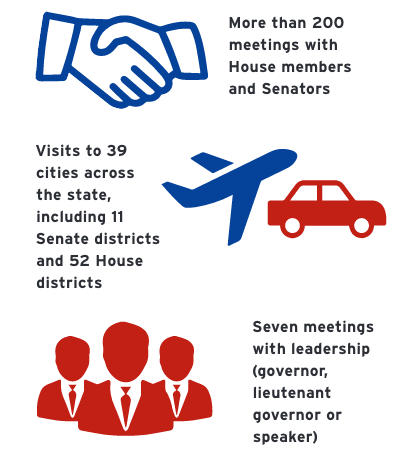
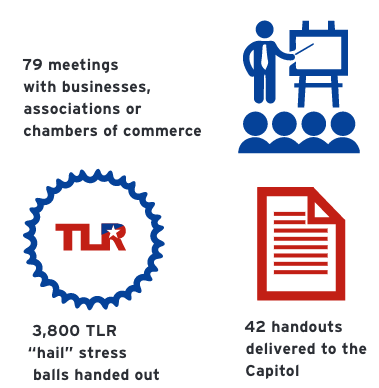
TLR Speaker’s Bureau Brings Tort Reform to You!
Need a speaker for your next event? TLR’s Speaker’s Bureau has volunteers available across the state to speak at your group’s next meeting. These engaging presentations help spread the word about what TLR is doing to make Texas a beacon for civil justice reform in America and how smart lawsuit reforms have strengthened our economy and helped our state thrive. To book a TLR speaker, please visit tortreformcstg.wpengine.com/tlr-speaker.
Spotlight: TLR Interns
Every semester, TLR provides internship opportunities to college students interested in getting a window into the legislative process. This session, TLR was proud to host three interns from the University of Texas at Austin, each of whom played a critical role in helping keep the wheels turning at the office while the staff was busy at the Capitol.
Katherine Stadler of Cypress has interned with TLR for more than a year. She is a senior pursuing dual degrees in finance and government. During her time at the university, she served on the University of Texas Supreme Court, was a Bill Archer fellow and led the university in key anti-sexual assault initiatives. When Katherine is not studying, she can be found watching every documentary Netflix has to offer.
Sydney Owens of Coppell is a senior finance major at the University of Texas at Austin. On campus, she served as president of DECA and was a member of the McCombs Leadership Cohort and the Leadership and Ethics Institute. When she is not immersed in her studies, Sydney enjoys playing and teaching the piano.
Lexi Darrow of Long Island, N.Y., is a junior pursuing a degree in government. She has previously interned in the U.S. Senate and was part of an extensive research project at UT that analyzed the role of social media in the 2016 presidential campaign. On campus, Lexi is a member of Student Government, where she works on outreach for out-of-state students, and will be a Bill Archer fellow in the upcoming year.
We are so glad to have engaged with these outstanding young women and look forward to seeing all that they accomplish
Puppy Paws and Makin’ Laws
Legislating can be a tough business for lawmakers and staff during the 140 days of session. TLR works closely with this talented and hardworking group of individuals all year long and wanted to do something special to help give them a break as session wound down. What better way to put a smile on someone’s face than by providing a chance to snuggle with an adorable puppy? We had a great turnout at “Puppy Paws and Makin’ Laws,” the brain-child of TLR Executive Director Mary Tipps. The event benefited the local animal shelter, Austin Pets Alive.
